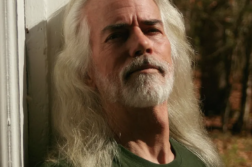FOR OVER THIRTY YEARS, Edmund White has been turning the messy, tragic and exalted experiences of life into transcendent and scintillating fiction; at 65, the author shows all the moxy and audacity of an enfant terrible. A blurb for his new book, My Lives: An Autobiography (Ecco/HarperCollins) refers to White’s “well-deserved reputation as America’s Marcel Proust.” While this may be an obvious comparison when it comes to his fiction, this pungent, no-holds-barred memoir displays his close affinity to André Gide, who was notable for his castigation of bourgeois society: “Families, I hate you! Shut-in homes, closed doors, jealous possessors of happiness!”
As the doyen of contemporary gay literature, White is grounded and pragmatic about his well-deserved fame and his ability to attract ambitious young disciples to his agora. A teacher and role model, he’s well known in the literary community for his encouragement of up-and-coming writers (including his longtime companion, Michael Carroll). White’s own literary success arrived when he was fairly young, in 1973, with Forgetting Elena, his impressionistic debut novel about a young man without qualities or memory, which won praise from his lifelong idol, Vladimir Nabokov. His next book, the lushly homoerotic Nocturnes for the King of Naples (1978), was hailed by Gore Vidal as “a baroque invention of quite startling brilliance and intensity.” White’s 1982 novel A Boy’s Own Story is widely recognized as a coming-of-age classic, with a hero who holds his own alongside Huck Finn or Holden Caufield.






